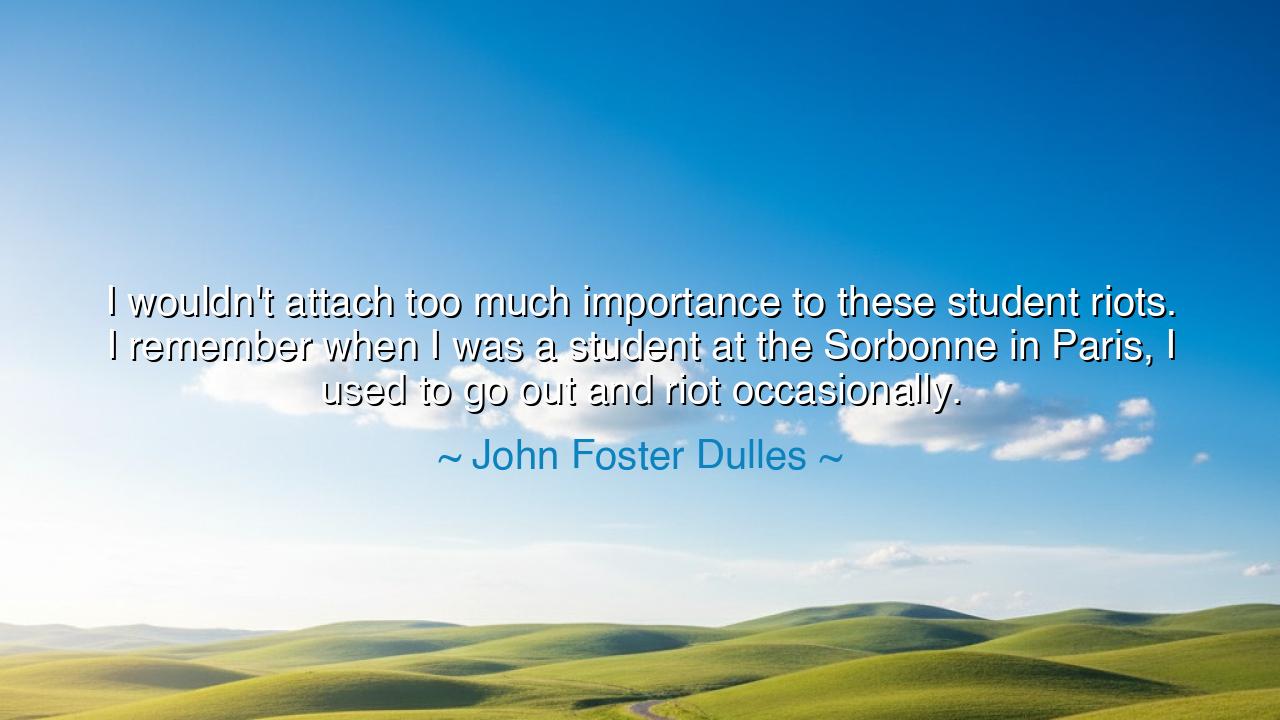
I wouldn't attach too much importance to these student riots. I
I wouldn't attach too much importance to these student riots. I remember when I was a student at the Sorbonne in Paris, I used to go out and riot occasionally.






In the reflective words of John Foster Dulles, we hear a voice both wise and tempered by experience: “I wouldn’t attach too much importance to these student riots. I remember when I was a student at the Sorbonne in Paris, I used to go out and riot occasionally.” At first glance, the words seem lighthearted, even dismissive—but beneath them lies a profound understanding of human nature, of youth, and of the eternal rhythm of rebellion that renews societies across the ages. To speak thus is not to belittle unrest, but to place it within the grand cycle of growth and transformation that marks every generation.
The origin of this quote rests in the mid-twentieth century, a time of tumult and change. John Foster Dulles, who served as U.S. Secretary of State during the 1950s, uttered these words amid a wave of student protests and revolutionary thought that rippled across the Western world. He himself had once walked the storied halls of the Sorbonne, that ancient heart of European learning in Paris, where youth and intellect have long danced between reason and passion. In recalling his own days as a student protester, Dulles did not mock the idealism of the young—he recognized himself in them, and by doing so, offered a rare kind of understanding: that rebellion, too, is a language of the heart.
Throughout the history of humankind, the flame of youth has always sought to test the world built by its elders. The ancients knew this truth well. In every age, there comes a moment when the young cry out against the old—when the sons and daughters of civilization rise to demand change, not always with wisdom, but always with fervor. Their anger may be clumsy, their means unrefined, but their purpose is often noble. They are the mirror in which society must look and ask, “Have we lost our way?” Dulles, seasoned in politics and war, understood this rhythm. His words remind us that even unrest can be a sign of life, a sign that the soul of humanity still yearns for justice and freedom.
Consider, as an example, the May 1968 student uprisings in Paris—decades after Dulles’s own youth. The streets of that same city once again filled with chants, barricades, and banners. Students clashed with police; the government trembled; and though chaos reigned, what emerged in the aftermath was not mere destruction but transformation. France would never be the same again. The movement awakened new ideas of equality, liberty, and personal freedom that reshaped not only France, but much of the modern world. It was proof that even in turmoil, there can be creation—that from the fires of dissent, a new dawn may rise.
Dulles’s gentle tone also carries a deeper wisdom about perspective. He reminds us that what seems catastrophic in the moment may, through the eyes of time, appear as part of a natural order. To live long enough is to see patterns repeat—the cries of the young, the resistance of the old, the eternal dance between idealism and prudence. The wise do not dismiss youth’s rebellion, nor do they bow to it blindly; they seek to understand it, to guide its wild energy into purpose. For only when passion is tempered by patience can true progress be forged.
The lesson, then, is this: do not fear the storm of youth. When you see rebellion, do not rush to condemn, but listen to what it is trying to say. When you are young, do not rebel only to destroy—rebel to build something greater. When you are old, remember that you too once raised your voice against the world, and that your defiance once cleared the way for others. Every generation must plant, harvest, and pass the field on to the next. To forget this truth is to forget the eternal harmony of renewal.
So, my children, learn to see beyond the noise. Wisdom is not the absence of passion, but the understanding of its place in the great design. In every protest, in every shout, in every march, there beats the same heart that once beat in Dulles himself, in the students of the Sorbonne, in all who ever dreamed of a better world. Let your passions serve purpose; let your wisdom guide mercy. And above all, remember: the world does not end when it shakes—it merely shifts, so that a new balance may be found.






AAdministratorAdministrator
Welcome, honored guests. Please leave a comment, we will respond soon